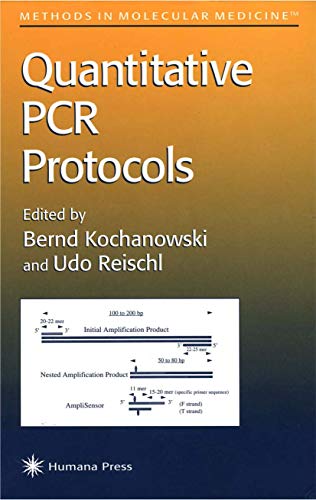Articoli correlati a Quantitative Pcr Protocols

Sinossi
Since the polymerase chain reaction (PCR) was first developed in 1985, an enormous number of research reports have documented the versatility of this brilliant technique for in vitro amplification of nucleic acids. Although PCR has had a profound impact in many areas of research, contrary to exp- tation its routine application to the quantitation of nucleic acids has proven problematic in several aspects. The shortcomings are principally caused by the exponential nature of PCR, whereby small variations in amplification ef- ciency may dramatically affect the yield of amplification product. Even mi- mal temperature deviations that occur between adjacent wells of a thermocycler or day-to-day variations in the efficiency of nucleic acid preparation can lead to significant differences in the extent of amplification between otherwise id- tical samples. However, knowing more about the intrinsic limitations of PCR is the first step towards surmounting the shortcomings associated with this prom- ing methodology. With the introduction of appropriate standards of known amount, which are co-amplified with the sample using the same primers, it is increasingly feasible to address biological or diagnostic questions that are d- ficult or impossible to answer using any other experimental approach.
Le informazioni nella sezione "Riassunto" possono far riferimento a edizioni diverse di questo titolo.
Dalla quarta di copertina
In Quantitative PCR Protocols, Bernd Kochanowski and Udo Reischl assemble a significant collection of established and novel methods for the successful quantitation of nucleic acids. Each method has been refined and tested by its developer and proven to work in such problems as the analysis of eukaryotic gene expression, the quantitation of viral loads in clinical specimens, reporter gene expression, and quantitative oncogene analysis. Particular emphasis is placed on the underlying principles of the design of competitive or noncompetitive standards, as well as on the optimization of the amplification process. In important cases several methods are given for the same problem so that readers may set up test systems tailored to their specific practical needs.
Quantitative PCR Protocols provides a collection of detailed methods that offers comprehensive and up-to-date information on how to control PCR to obtain reliable quantitation. With its step-by-step instructions researchers can really master the complexities of PCR and address otherwise inaccessible biological and diagnostic questions.
Le informazioni nella sezione "Su questo libro" possono far riferimento a edizioni diverse di questo titolo.
- EditoreHumana Pr Inc
- Data di pubblicazione1999
- ISBN 10 0896035182
- ISBN 13 9780896035188
- RilegaturaCopertina rigida
- LinguaInglese
- Numero edizione1
- Numero di pagine180
- RedattoreKochanowski Bernd, Reischl Udo
- Contatto del produttorenon disponibile
EUR 7,00 per la spedizione da Germania a Italia
Destinazione, tempi e costiRisultati della ricerca per Quantitative Pcr Protocols
Quantitative PCR protocols. Methods in Molecular Medicine; 26.
Da: Antiquariat Bookfarm, Löbnitz, Germania
Hardcover. 1st ed. 1999. 316 S. Ehem. Bibliotheksexemplar mit Signatur und Stempel. GUTER Zustand, ein paar Gebrauchsspuren. Ex-library with stamp and library-signature. GOOD condition, some traces of use. R14990 9780896035188 Sprache: Englisch Gewicht in Gramm: 550. Codice articolo 2471206
Quantità: 1 disponibili
Quantitative PCR Protocols (Methods in Molecular Medicine)
Da: Ammareal, Morangis, Francia
Hardcover. Condizione: Très bon. Ancien livre de bibliothèque avec équipements. Edition 1999. Ammareal reverse jusqu'à 15% du prix net de cet article à des organisations caritatives. ENGLISH DESCRIPTION Book Condition: Used, Very good. Former library book. Edition 1999. Ammareal gives back up to 15% of this item's net price to charity organizations. Codice articolo G-051-875
Quantità: 1 disponibili
Quantitative PCR Protocols (Methods in Molecular Medicine)
Da: Eastburn Books, Albany, OR, U.S.A.
Hardcover. Condizione: Very Good. VG hardcover. 1999. About 10 pages with hard crease/bump to corner. Pages clean/unmarked. Covers bright/clean. LIght scuffs. Binding solid. Diagrams throughout. 304 pp. Codice articolo L06551
Quantità: 1 disponibili
